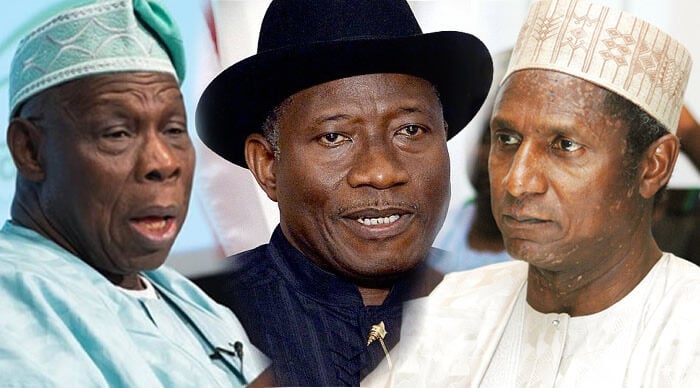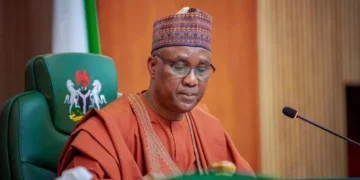Former President Olusegun Obasanjo has lamented the inability of administrations that succeeded his own to combat corruption as the main reason why it still festers in the country today.
Obasanjo said that while he did his best by diagnosing the problem and providing a prescription to the dreaded monster, there were no follow-ups to what he did after leaving office in 2007.
The former president lamented in his forthcoming book, Nigeria: Past and Future, that a single regime would not succeed in the fight against corruption without continuity by subsequent regimes.
Though he did not mention the names of the leaders, he lamented that succeeding administrations did not sustain his efforts.
Obasanjo took over from General Abdulsalami Abubakar on May 29, 1999, and stayed in office for eight years.
He handed over power to Alhaji Musa Yar’Adua, who died in office on May 5, 2010, which made his deputy, Dr Goodluck Jonathan, assume office as president on the same day.
Jonathan was in office until May 29, 2015, when President Muhammadu Buhari defeated him in an election. Buhari, who died in July 2025, handed over to President Bola Tinubu on May 29, 2023.
LEADERSHIP Weekend recalls that Obasanjo established both the Independent Corrupt Practices and Other Related Offences Commission (ICPC) and the Economic and Financial Crimes Commission (EFCC) to fight corruption in the country.
Many former governors, ministers, and other high-ranking government officials were prosecuted by the EFCC, headed by Nuhu Ribadu under Obasanjo.
It was during his regime that a serving Inspector General of Police, Tafa Balogun, was arrested, tried, and jailed.
Obasanjo said when he took over in 1999, he spoke about the rot in government and explained what he planned to do to bring about changes and a new order.
Regrettably, he said, the regimes that followed his own went to sleep after assuming office.
“When in 1999 I took over as democratically elected president, 27 years after my stint as military Head of State, I dwelt a little bit on the rot in government and what I would do to bring about changes and a new order.”
He recalled his inaugural speech during which he said he identified corruption as the greatest single bane of society, which he said would be tackled head-on at all levels.
He had said:
“Corruption is incipient in all human societies and in most human activities, but it must be condemned. This is why laws are made and enforced to check corruption so that society will survive and develop in an orderly, reasonable and predictable way.
No society can survive anything near its full potential if it allows corruption to become the full-blown cancer it has become in Nigeria. One of the greatest tragedies of military rule in recent times is that corruption was allowed to grow unchallenged and unchecked, even when it was glaring for everybody to see. Rules and regulations for doing official business were deliberately ignored, set aside, or by-passed to facilitate corrupt practices.”
Despite his achievements in that area, Obasanjo lamented that those who came to office after him did almost nothing to build on his efforts.
According to him: “A bit of diagnosis and a bit of prescription here – all to enhance governance and drastically reduce corruption. But the work of one regime without continuity by following regimes would amount to nothing. That follow-up from following regimes was not there. What a pity.”
The two-time president said this is why Nigeria is seen as a disappointment in Africa in particular and the world in general.
For example, he recalled what the late South African president, Nelson Mandela, allegedly said about Nigeria:
“You know I am not very happy with Nigeria. Your leaders have no respect for their people. They believe that their personal interests are the interest of the people.
They take people’s resources and turn them to personal wealth. There is a level of poverty in Nigeria that should be unacceptable. I cannot understand why Nigerians are not angrier than they are.
Your elections are like wars. Now we hear that you cannot be president in Nigeria unless you are Muslim or Christian.”
Obasanjo also revealed that Mandela said corrupt people cannot make good leaders:
“You should encourage leaders to emerge who will not confuse public office with sources of making personal wealth. Corrupt people do not make good leaders.
Then you have to spend a lot of resources for education. Educate children of the poor, so that they can get out of poverty. Poverty does not breed confidence. Only confident people can change things. Poor and uneducated people can also bring changes, but it will be hijacked by the educated and the wealthy…give young Nigerians good education.
Teach them the value of hard work and sacrifice and discourage them from crimes which are destroying your image as a good people,” Obasanjo quoted Mandela to have said.
Obasanjo Should Be Ignored, Says Presidency Source
Meanwhile, a source in the Presidency said nobody should be worried about whatever Obasanjo says, adding that the former president believes he is the only righteous man in the world.
“There is no need to respond to Obasanjo. He thinks, believes, and acts as if he is the only man that is right. That is a man who has ruled the country more than any other leader. So, allow him to enjoy himself. We wish him well,” the source added.











